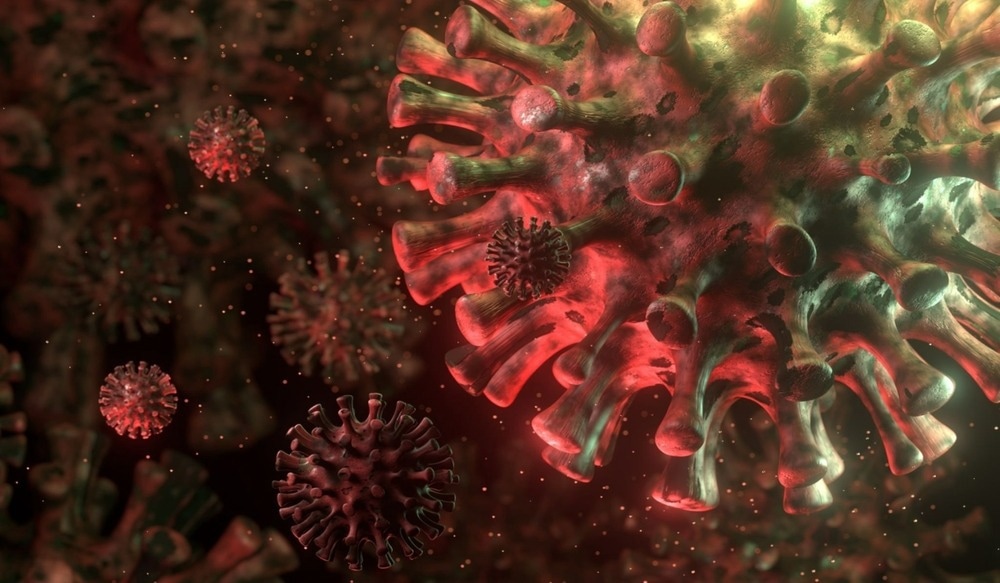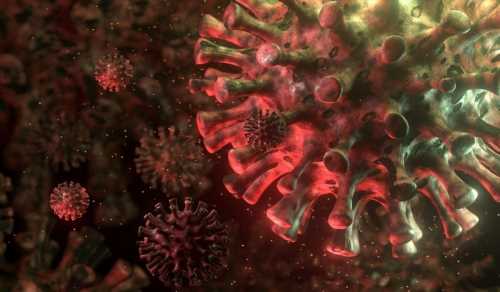Although most severe acute respiratory syndrome coronavirus 2 (SARS-CoV-2)-infected individuals experience mild symptoms, some contract a severe infection that affects multiple organs in the acute phase. It is imperative to understand the disease mechanism to manage the infection effectively.

Background
In eukaryotes, ubiquitination is a type of reaction catalyzed by three enzymes, namely, the E1 ubiquitin-activating enzyme, the E2 ubiquitin-conjugating enzyme, and the E3 ubiquitin ligase enzyme. This process is reversed by deubiquitinating enzymes.
During protein ubiquitination modification, the main function of E2 is substrate selection, and E3 determines substrate specificity. The key role of ubiquitin and its modifier enzymes are associated with innate and adaptive immune responses, membrane trafficking, transcription, and signal transduction.
Viruses are involved with ubiquitin and ubiquitin-like modifiers via various mechanisms. For instance, some viruses encode a protein that causes alteration of substrate specificity to favor replication. The viral protein can effectively change the host’s ubiquitin and ubiquitin-like machinery. In addition, some viruses encode their own ubiquitinating or deubiquitinating enzymes.
Typically, viruses rely on the ubiquitination and degradation of host surface receptors to escape T-cell recognition. Nevertheless, the host depends on the ubiquitin-proteasome system to tackle viral infections by producing target structures recognized by T-cells. The majority of viral proteins can be altered post-translationally.
For instance, out of 27 SARS coronavirus proteins detected, 21 were ubiquitinated. Several ubiquitin sites are differentially expressed upon SARS-CoV-2 infection, demonstrating their key role in COVID-19 patients. Interestingly, ubiquitin is linked to the host’s immune response to COVID-19.
About the study
A recent Clinical and Translational Medicine study utilized several published public datasets to evaluate the biological characteristics associated with the ubiquitination of patients infected with SARS-CoV-2. The ubiquitin gene profile helped identify the specific biological characteristics and clinical prognosis linked to these patients’ organs.
A comprehensive analysis based on biocomputational and immunological estimations helped indicate the disease development linked with ubiquitination. It was observed that post-SARS-CoV-2 infection, ubiquitin gene expression altered. This finding was based on the autopsy report of the lung of SARS-CoV-2 infected individuals.
A549 cells transfected with SARS-CoV-2 revealed alteration in ubiquitin expression profiles. This observation was validated in a time-dependent manner. A higher level of ubiquitin expression was found in the immune histology post-SARS-CoV-2 infection, which was linked to immune responses.
Interestingly, the blood leukocytes of SARS-CoV-2 infected individuals indicated significant upregulation of the ubiquitin-associated pathway. The authors found a high negative correlation between levels of ubiquitin clusters and inflammatory reactions. This is a favorable outcome for COVID-19 patients, owing to enhanced immune infiltration and response.
Ubiquitination stratification was found to be a favorable differentiator for COVID-19 patients, which was associated with significant differences in clinical inflammatory indicators, ICU occupancy rates, and mechanical ventilation probability. The high ubiquitination of COVID-19 patients was strongly correlated with positive outcomes and reduced inflammatory states.
The clinical inflammatory syndrome was evaluated using indicators such as ferritin, D-dimer, and C-reactive proteins. A higher ubiquitin cluster represented lower inflammation, whereas a low ubiquitin cluster was associated with a poor prognosis. The high ubiquitin cluster represented higher infiltrations of T-cells, B-cells, and dendritic cells. In contrast, lower ubiquitination was linked to the enhancement of epithelial cells, basophils, platelets, neutrophils, and endothelial cells.
The gene ontology pathway enrichment annotation, along with upregulated genes associated with high ubiquitination groups, was found to be involved in the T cell-based immune response. Upregulation of genes of low ubiquitination was involved with positive neutrophil mediation regulation and negative cytokine-mediated signaling regulation. In severely infected COVID-19 patients, elevated neutrophil levels were found, which could be due to the formation of neutrophil extracellular traps.
Molecular risk models were developed based on six biomarkers, including three risk factors (CYSTM1, GLDN, and PCOLCE2) and three protective factors (SDSL, SEZ6L, and TNFRSF18). They were used to evaluate disease prognosis.
Conclusions
The findings of the current study strongly indicated that higher ubiquitin levels could act as a protective factor in SARS-CoV-2-infected patients. Based on the screening of biomarkers, prognostic stratification, and the construction of a risk model, scientists were able to shed light on the development of promising clinical interventions and disease management.
- Che, Y. et al. (2022) Elevated ubiquitination contributes to protective immunity against severe SARS-CoV-2 infection. Clinical and Translational Medicine. 12, e1103. doi: 10.1002/ctm2.1103 https://onlinelibrary.wiley.com/doi/10.1002/ctm2.1103
Posted in: Medical Science News | Medical Research News | Disease/Infection News
Tags: Blood, Cell, Coronavirus, Coronavirus Disease COVID-19, covid-19, Cytokine, D-dimer, Enzyme, Eukaryotes, Gene, Gene Expression, Genes, Histology, Immune Response, immunity, Inflammation, Ligase, Medicine, Membrane, Neutrophils, Platelets, Protein, Respiratory, SARS, SARS-CoV-2, Severe Acute Respiratory, Severe Acute Respiratory Syndrome, Syndrome, T-Cell, Transcription, Ubiquitin, Ubiquitin ligase, Ubiquitin-Conjugating Enzyme

Written by
Dr. Priyom Bose
Priyom holds a Ph.D. in Plant Biology and Biotechnology from the University of Madras, India. She is an active researcher and an experienced science writer. Priyom has also co-authored several original research articles that have been published in reputed peer-reviewed journals. She is also an avid reader and an amateur photographer.
Source: Read Full Article
